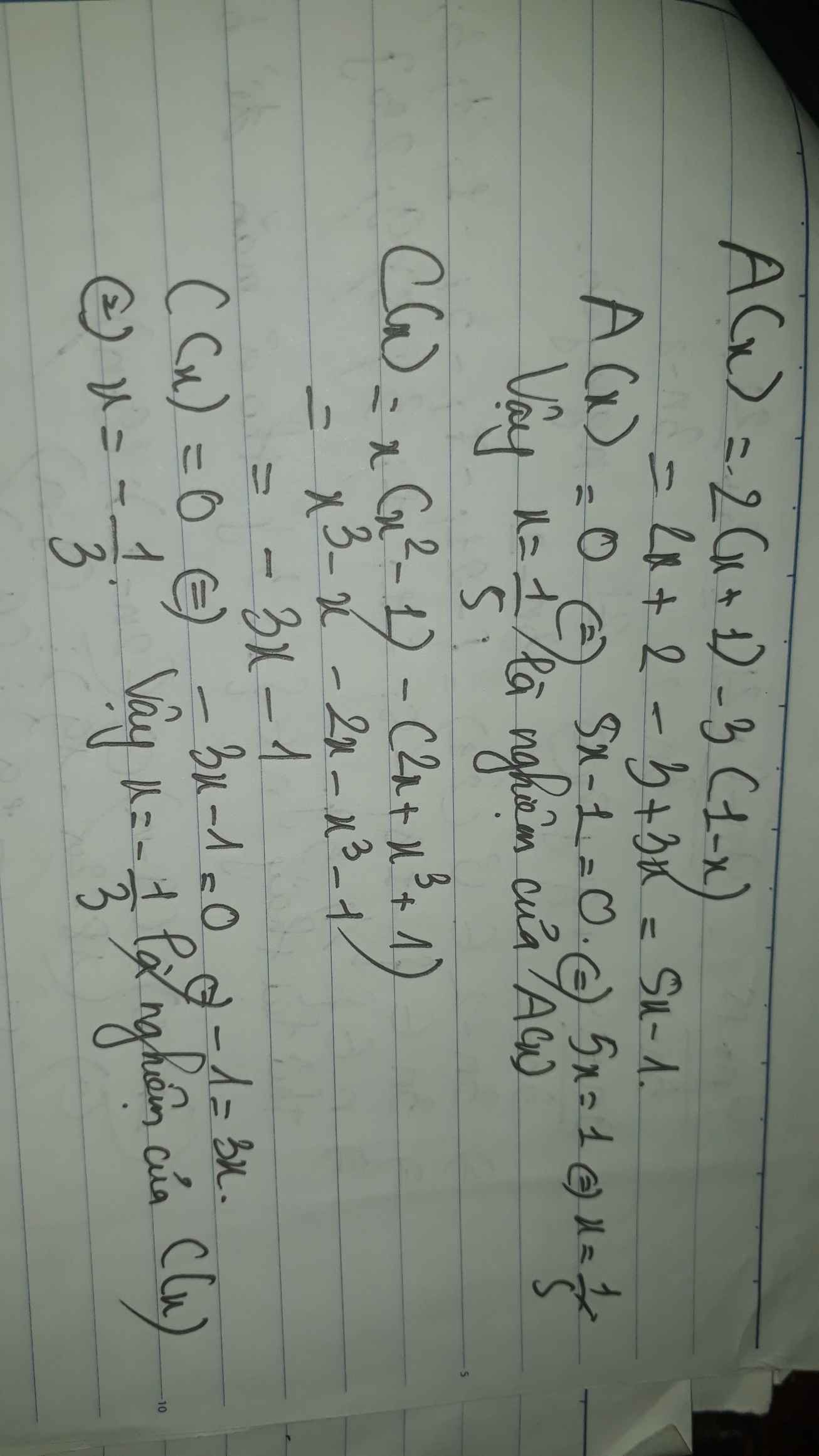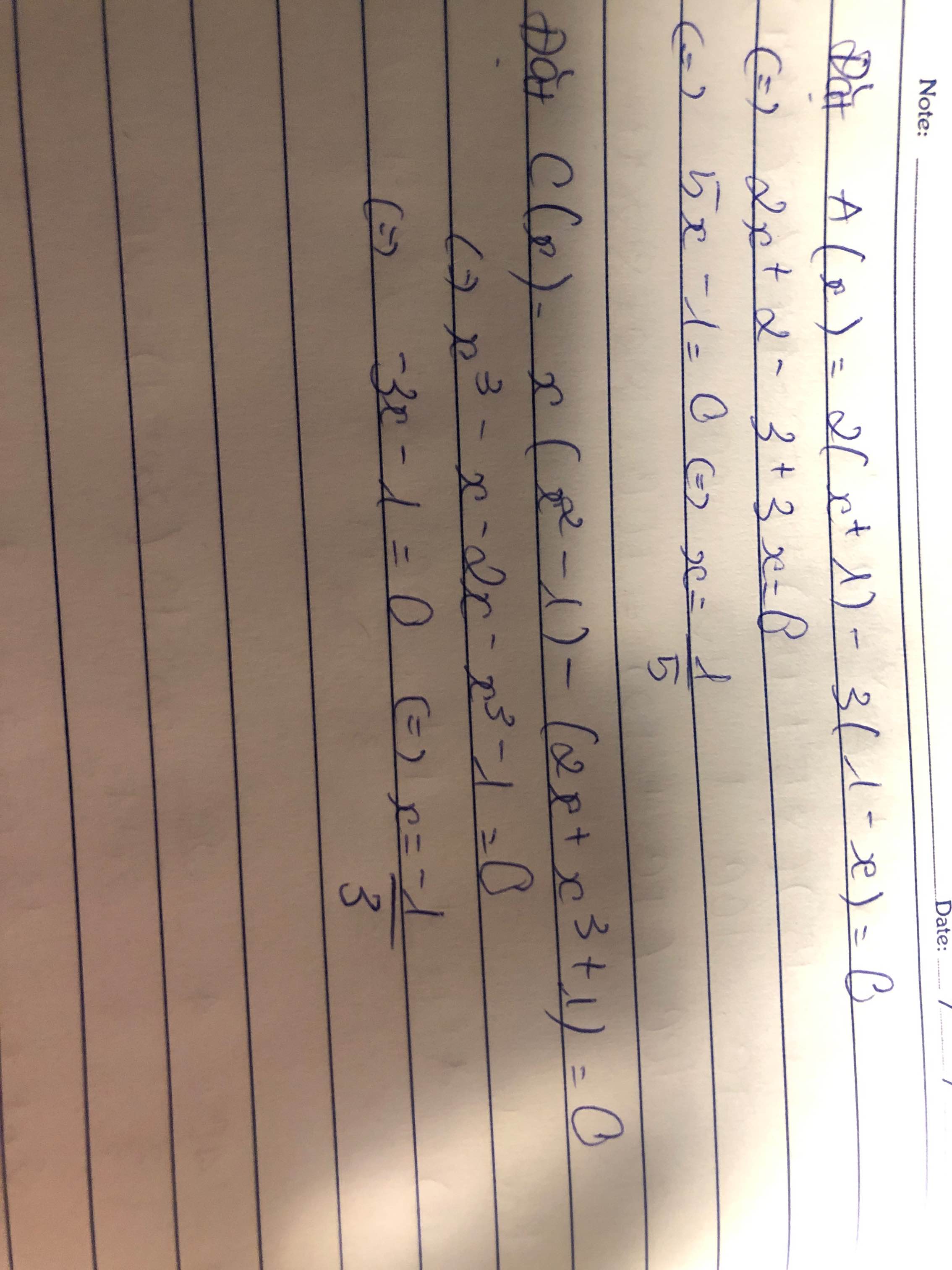Tìm nghiệm của (x-1) (x -2) ( x-3) + (x+1) (x+2) (x+3) - 2x^3 = 41

Những câu hỏi liên quan
Giải phương trình:
1) (3x-1)^2-5(2x+1)^2+96x-3)(2x+1)=(x-1)^2
2) (x+2)^3-(x-2)^3=12(x-1)-8
3) x-1/4-5-2x/9=3x-2/3
4) 25x-655/95-5(x-12)/209=[89-3x-2(x-13)/5]/11
5) 29-x/21+27-x/23+25-x/25+23-x/27=-4
6) x-69/30+x-67/32=x-63/36+x-61/38
7)x+117/19+x+4/28+x+3/57=0
8) 59-x/41+57-x/43+2=x-55?45+x-53/47-2
9) Cho phương trình: mx+x-m^2=2x-2 (x là ẩn). Tìm m để phương trình:
a) Có nghiệm duy nhất
b) Vô số nghiệm
c) Vô nghiệm
tìm nghiệm của đơn thức:
A(x)= 2(x+1) - 3(1-x)
C(x)= x(x^2-1) - (2x+x^3+1)
A(x) = 2x+2-3+3x
A(x) = 5x-1
C(x) = x3 -x - 2x - x3 - 1
C(x) = x - 1
Đúng thì like giúp mik nha bạn. Thx bạn
Đúng 0
Bình luận (0)
P(x)=x^3 -2x^2+3x+4 Q(x) = -x^3+2x^2-2x-1 tìm nghiệm của P(x) + Q(x)
sự im lặng đến bất thường
hoc24h ban đêm đáng sợ đến thế sao
Đúng 0
Bình luận (2)
\(P\left(x\right)+Q\left(x\right)=0\Leftrightarrow x^3-2x^2+3x+4-x^3+2x^2-2x-1=x+3=0\)
\(\Leftrightarrow x=-3\)
Đúng 1
Bình luận (0)
P(x)+Q(x)=0
\(\Leftrightarrow x+3=0\)
hay x=-3
Đúng 2
Bình luận (0)
tìm X
1/4+2.(3.x-2/3)=1
(1/2+2X). (2x-3)=0
(4x-5).(5/4.x-2)=0
1/9-(2.x+1/2)mũ 2=0
9.(3x-1/2)mũ 2 =4
1/2.x+2/3.x-1=-10/3
X+1/12=-3/9
a) \(x=\dfrac{25}{72}\)
b)\(x=-\dfrac{1}{4}\)
\(x=\dfrac{3}{2}\)
c)\(x=\dfrac{5}{4}\) hoặc
x \(=\dfrac{8}{5}\)
d và e chịu vì mk kg giỏi lắm về mũ
f)\(x=-2\)
G)\(x=-\dfrac{5}{12}\)
Đúng 1
Bình luận (0)
Tìm số nghiệm của các phương trình sau
A 2x+2/3x+2 = x+1/x-2
B 1 +2/x-2 = 10/x+3 -50/(2-x) (x+3)
C x+3/(x+1)^2=4x-2/(2x-1)^2
D x+1/x+2 + x-1/x-2 =2x+1/x+1
tìm nghiệm của các đa thức sau:
a)3x-6;
b)2x-10;
c)x^2-1;
d)(x-2)*(x+3);
e)x^2-2x;
f)(x^2)+2;
g)x^3-4x;
h)3-2x
a)Đặt A (x) = 0
hay \(3x-6=0\)
\(3x\) \(=6\)
\(x\) \(=6:3\)
\(x\) \(=2\)
Vậy \(x=2\) là nghiệm của A (x)
b) Đặt B (x) = 0
hay \(2x-10=0\)
\(2x\) \(=10\)
\(x\) \(=10:2\)
\(x\) \(=5\)
Vậy \(x=5\) là nghiệm của B (x)
c) Đặt C (x) = 0
hay \(x^2-1=0\)
\(x^2\) \(=1\)
\(x^2\) \(=1:1\)
\(x^2\) \(=1\)
\(x\) \(=\overset{+}{-}1\)
Vậy \(x=1;x=-1\) là nghiệm của C (x)
d) Đặt D (x) = 0
hay \(\left(x-2\right).\left(x+3\right)=0\)
⇒ \(x-2=0\) hoặc \(x+3=0\)
* \(x-2=0\) * \(x+3=0\)
\(x\) \(=0+2\) \(x\) \(=0-3\)
\(x\) \(=2\) \(x\) \(=-3\)
Vậy \(x=2\) hoặc \(x=-3\) là nghiệm của D (x)
Đúng 2
Bình luận (0)
e) Đặt E (x) = 0
hay \(x^2-2x=0\)
⇔\(\left[{}\begin{matrix}x^2-2x\\\left(x-2\right)x\end{matrix}\right.\)
⇒\(\left(x-2\right)x\)
⇔ \(x.\left(2x-1\right)=0\)
⇔ \(\left[{}\begin{matrix}x=0\\2x-1=0\end{matrix}\right.\)
\(\left\{{}\begin{matrix}x=0\\x=2\end{matrix}\right.\)
Vậy \(x=0\) hoặc \(x=2\) là nghiệm của E (x)
f) Đặt F (x) = 0
hay \(\left(x^2\right)+2=0\)
\(x^2\) \(=0-2\)
\(x^2\) \(=-2\)
\(x\) \(=\overset{-}{+}-2\)
Do \(\overset{+}{-}-2\) không bằng 0 nên F (x) không có nghiệm
Vậy đa thức F (x) không có nghiệm
g) Đặt G (x) = 0
hay \(x^3-4x=0\)
⇔\(\left[{}\begin{matrix}x^3-4x\\\left(x-4\right)x^2\end{matrix}\right.\)
⇒ \(\left(x-4\right)x^2=0\)
⇔ \(x.\left(4x-1\right)=0\)
⇔\(\left[{}\begin{matrix}x=0\\4x-1=0\end{matrix}\right.\)
\(\left\{{}\begin{matrix}x=0\\x=\dfrac{1}{4}\end{matrix}\right.\)
Vậy \(x=0\) hoặc \(x=\dfrac{1}{4}\) là nghiệm của G (x)
h) Đặt H (x) = 0
hay \(3-2x=0\)
\(2x\) \(=3+0\)
\(2x\) \(=3\)
\(x\) \(=3:2\)
\(x\) \(=\dfrac{3}{2}\)
Vậy \(x=\dfrac{3}{2}\) là nghiệm của H (x)
CÂU G) MIK KHÔNG BIẾT CÓ 2 NGHIỆM HAY LÀ 3 NGHIỆM NỮA
Đúng 2
Bình luận (1)
a, x=2
b, x=5
c, x=1
d, x=2 hoặc x=-3
e, x=2
f, không có số x nào thỏa mãn
g, x=2
h, x= 1,5
Đúng 1
Bình luận (0)
Tìm tập nghiệm của phương trình
a/ \(x-\sqrt{2x+3}=-2x\)
b/ \(\dfrac{1}{x}=1-\dfrac{1}{x+1}\)
c/ \(\dfrac{2}{\sqrt{x+3}}=\dfrac{1}{\sqrt{x^2-9}}\)
a) \(x-\sqrt{2x+3}=-2x\)
\(\Leftrightarrow\sqrt{2x+3}=x+2x\)
\(\Leftrightarrow\sqrt{2x+3}=3x\)
\(\Leftrightarrow2x+3=9x^2\)
\(\Leftrightarrow9x^2-2x-3=0\)
\(\Rightarrow\Delta=\left(-2\right)^2-4\cdot9\cdot\left(-3\right)=112>0\)
\(\Leftrightarrow\left[{}\begin{matrix}x_1=\dfrac{2+\sqrt{112}}{18}=\dfrac{1+2\sqrt{7}}{9}\\x_2=\dfrac{2-\sqrt{112}}{18}=\dfrac{1-2\sqrt{7}}{9}\end{matrix}\right.\)
b) \(\dfrac{1}{x}=1-\dfrac{1}{x+1}\) (ĐK: \(x\ne0,x\ne-1\))
\(\Leftrightarrow\dfrac{1}{x}+\dfrac{1}{x+1}=1\)
\(\Leftrightarrow\dfrac{x+1}{x\left(x+1\right)}+\dfrac{x}{x\left(x+1\right)}=1\)
\(\Leftrightarrow\dfrac{x+1+x}{x\left(x+1\right)}=1\)
\(\Leftrightarrow\dfrac{2x+1}{x^2+x}=1\)
\(\Leftrightarrow2x+1=x^2+1\)
\(\Leftrightarrow x^2-2x=0\)
\(\Leftrightarrow x\left(x-2\right)=0\)
\(\Leftrightarrow\left[{}\begin{matrix}x=0\left(ktm\right)\\x-2=0\end{matrix}\right.\)
\(\Leftrightarrow x=2\left(tm\right)\)
Đúng 2
Bình luận (0)
c) \(\dfrac{2}{\sqrt{x+3}}=\dfrac{1}{\sqrt{x^2-9}}\) (ĐK: \(x\ge3\))
\(\Leftrightarrow2\sqrt{x^2-2}=\sqrt{x+3}\)
\(\Leftrightarrow\sqrt{4\left(x^2-9\right)}=\sqrt{x+3}\)
\(\Leftrightarrow4\left(x^2-9\right)=x+3\)
\(\Leftrightarrow4x^2-36=x+3\)
\(\Leftrightarrow4x^2-x-36-3=0\)
\(\Leftrightarrow4x^2-x-39=0\)
\(\Rightarrow\Delta=\left(-1\right)^2-4\cdot4\cdot\left(-39\right)=625>0\)
\(\Leftrightarrow\left[{}\begin{matrix}x_1=\dfrac{1+\sqrt{625}}{8}=\dfrac{13}{4}\left(tm\right)\\x_2=\dfrac{1-\sqrt{625}}{8}=-3\left(ktm\right)\end{matrix}\right.\)
Đúng 2
Bình luận (0)
Giải phương trình:
1) (3x-1)^2-5(2x+1)^2+96x-3)(2x+1)(x-1)^2
2) (x+2)^3-(x-2)^312(x-1)-8
3) x-1/4-5-2x/93x-2/3
4) 25x-655/95-5(x-12)/209[89-3x-2(x-13)/5]/11
5) 29-x/21+27-x/23+25-x/25+23-x/27-4
6) x-69/30+x-67/32x-63/36+x-61/38
7)x+117/19+x+4/28+x+3/570
8) 59-x/41+57-x/43+2x-55?45+x-53/47-2
9) Cho phương trình: mx+x-m^22x-2 (x là ẩn). Tìm m để phương trình:
a) Có nghiệm duy nhất
b) Vô số nghiệm
c) Vô nghiệm
Đọc tiếp
Giải phương trình:
1) (3x-1)^2-5(2x+1)^2+96x-3)(2x+1)=(x-1)^2
2) (x+2)^3-(x-2)^3=12(x-1)-8
3) x-1/4-5-2x/9=3x-2/3
4) 25x-655/95-5(x-12)/209=[89-3x-2(x-13)/5]/11
5) 29-x/21+27-x/23+25-x/25+23-x/27=-4
6) x-69/30+x-67/32=x-63/36+x-61/38
7)x+117/19+x+4/28+x+3/57=0
8) 59-x/41+57-x/43+2=x-55?45+x-53/47-2
9) Cho phương trình: mx+x-m^2=2x-2 (x là ẩn). Tìm m để phương trình:
a) Có nghiệm duy nhất
b) Vô số nghiệm
c) Vô nghiệm
Cho f(x)= x^5-2x^2+x^4 -x^5+3x^2-x^4-3+2x
a, Tìm x để f(x)= -3
b, Tìm nghiệm của f(x) biết :x^2+2x-3=(x-1).(x+3)
Giúp mik với!!!!!!!!
a) Ta có: f(x)=-3
<=>x5-2x2+x4-x5+3x2-x4-3+2x=-3
<=>(x5-x5)+(-2x2+3x2)+(x4-x4)+2x-3=-3
<=>x2+2x-3=-3
<=>x2+2x=0
<=>x(x+2)=0
<=>x=0 hoặc x+2=0
<=>x=0 hoặc x=-2
Vậy..........
b)đa thức f(x) có nghiệm
<=>f(x)=0
<=>x2+2x-3=0
<=>x2+3x-x-3=0
<=>x(x+3)-(x+3)=0
<=>(x-1)(x+3)=0
<=>x-1=0 hoặc x+3=0
<=>x=1 hoặc x=-3
Vậy nghiệm của đa thức f(x) là x=-3;x=1
Đúng 0
Bình luận (0)




























